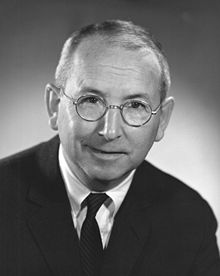Paul D. MacLean
| Paul D. MacLean | |
|---|---|
 |
|
| Born |
May 1, 1913 Phelps, New York |
| Died | December 26, 2007 (aged 94) |
| Nationality | American |
| Fields | Neuroscience |
| Institutions |
University of Edinburgh Yale Medical School National Institute of Mental Health |
| Known for | The triune brain theory |
Paul D. MacLean (May 1, 1913 – December 26, 2007) was an American physician and neuroscientist who made significant contributions in the fields of physiology, psychiatry, and brain research through his work at Yale Medical School and the National Institute of Mental Health. MacLean's evolutionary triune brain theory proposed that the human brain was in reality three brains in one: the reptilian complex, the limbic system, and the neocortex.
Paul D. Maclean was born in Phelps, New York, the third of four sons of a Presbyterian minister. He received his bachelor's degree in English from Yale University in 1935 and intended to study philosophy in Edinburgh, Scotland at the University of Edinburgh, but after a family illness, spent a year completing pre-medical work in Edinburgh instead. MacLean received his medical degree from Yale in 1940.
During World War II, MacLean served as a medical officer in the United States Army from 1942 to 1946. During his service with Yale's 39th General Hospital Brigade in New Zealand, MacLean worked together with Dr. Averill Liebow to show that the diphtheria bacillus was a cause of tropical ulcers, paving the way for successful prophylaxis and treatment.
...
Wikipedia
